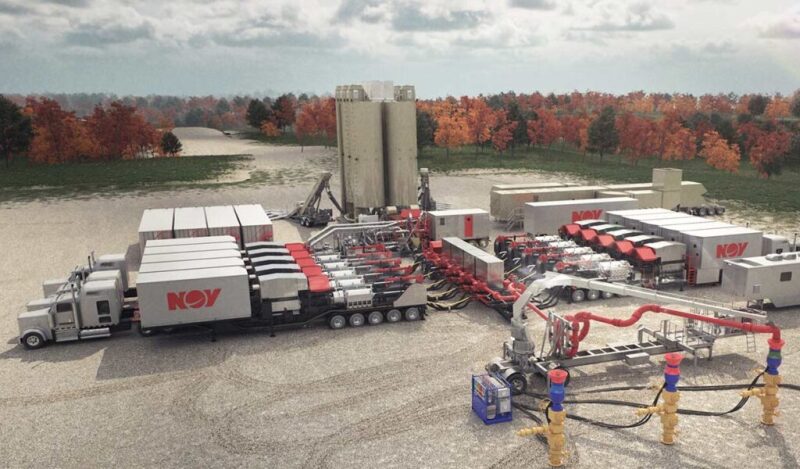NextTier Oilfield Solutions announced today that it has recently started field testing electric fracturing pump technology developed by National Oilwell Varco (NOV). The two Houston-based energy companies are looking to the electric-based systems, also known as e-fleets, to improve efficiency and lower emissions at unconventional wellsites in the US.
NextTier is currently using prototypes in the field and, if the pilot proves out, then the pressure pumper may end up purchasing the first e-fleet manufactured by NOV, the announcement said. NextTier added that its pending adoption of e-fleets would complement its dual-fuel fracturing fleets that can run on either diesel fuel or cleaner-burning natural gas.
Like other commercial e-fleets, NOV’s system relies on gas turbines to generate power that is then used to drive the high-horsepower pumps. NOV noted that its new units can also be run off other available sources of electricity such as centralized field power or a mobile generator.
The agreement with NextTier, one of the largest service companies in the US, represents the latest major endorsement of e-fleet technology which has emerged in recent years to become a competitive offering as more onshore operators seek to lower their fuel costs while also trimming their carbon footprint.
By using available field gas, NOV estimates the fuel savings over traditional fracturing fleets is up to 89%. The company also estimates that its e-fleet technology could reduce carbon emissions by up to 74%. This is based on a comparison with the latest diesel-powered fleets and assumes that excess field gas is flared instead of consumed for on-site power generation.
NOV said electric units also bring the advantages of running quieter, reducing noise nuisance, and because of their greater energy density, a smaller number of units are needed on site, reducing wellsite traffic while taking up less space.
Other features the oilfield equipment maker highlighted included the ability to control the entire e-fleet remotely which improves efficiencies and removes people from having to enter hazardous areas on the worksite.
NOV is also pairing its e-fleet with a new blender system that it said will comply with new silica air-quality regulations and automate the manual process of loading chemicals while pumping.
NextTier has launched other low-carbon initiatives within its operations, including the testing of “warm-stop” systems that automatically turn fracturing pumps off in between stages to reduce fuel consumption.


